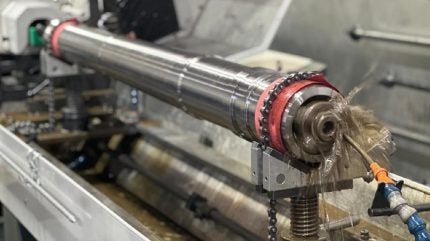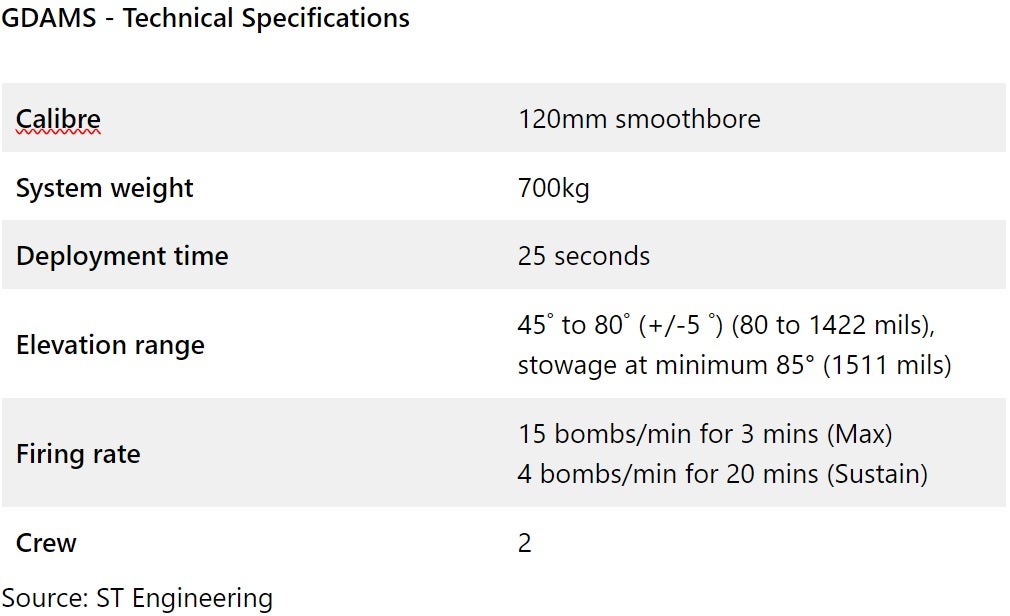
Babcock has provided more information on the development of a UK mortar capability for possible use by the British Army, stating that Perfect Bore Manufacturing had been tasked with the manufacture of 120mm barrels.
The move will re-establish barrel manufacturing in the UK, Babcock stated, as it proceeds with its vehicle agnostic 120mm Ground-based Deployable Mortar System (GDAMS), which is being developed for UK use in partnership with Singapore’s ST Engineering.
“Our long-standing experience with the British Army and integration expertise will ensure that we offer the optimum solution that the army needs to strengthen UK defence,” Babcock stated in a mid-August social media post.
UK-based Perfect Bore Manufacturing operate across a range of sectors, including oil and gas, automotive, nuclear, aerospace, and defence. In defence and aerospace, its systems have notably been used on the A400M military transport aircraft, produced by Airbus.
Planned onshoring of manufacture now a reality
In April 2024 Babcock and ST Engineering signed a collaboration agreement to offer land domain technologies, with an initial focus on mortar systems, indicating a potential future offering to the British Army in the form of a light vehicle-mounted mobile fires capability.
Announcing the agreement on 5 March, officials from Babcock and ST Engineering stated the companies would pursue defence opportunities “in markets of joint interest” that will see the combination of Babcock’s “close working relationship with the British Armed Forces” with ST Engineering’s “world-leading land systems products”.
How well do you really know your competitors?
Access the most comprehensive Company Profiles on the market, powered by GlobalData. Save hours of research. Gain competitive edge.

Thank you!
Your download email will arrive shortly
Not ready to buy yet? Download a free sample
We are confident about the unique quality of our Company Profiles. However, we want you to make the most beneficial decision for your business, so we offer a free sample that you can download by submitting the below form
By GlobalDataST Engineering offers two main land mortar capabilities: the Ground Deployed Advanced Mortar System (GDAMS), and the 120mm Super Rapid Advanced Mortar System (SRAMS). At the time, the development of a 120mm mortar offering for any UK requirement was understood to include onshoring ambitions.
The mid-August social media post from Babcock indicates that the company is pursuing the GDAMS system for the UK military market.

One possible combination of the Babcock-ST Engineering agreement could see a 120mm mortar such as the GDAMS teamed with an HMT 6×6 Jackal 3, designed by Supacat and currently being manufactured by Babcock and Supacat for the British Army.
British Army seeking to consolidate light vehicle fleet
As part of its consolidation efforts, the British Army is seeking to reduce the 16 vehicle types currently in service in the mobility fleet down to around five designs under the Land Mobility Programme (LMP), as drives towards commonality and the benefits common base platforms can provide gain greater influence.
In-service platforms that will be part of this consolidation effort include the Wolfhound, Mastiff, and Ridgeback protected mobility platforms, the Panther and Foxhound 4x4s, the tracked Bulldog FV430, as well as utility platforms such as the Land Rover and Pinzgauer.
Overall platform numbers being sought under the LMP effort are still being refined, but information disclosed in 2023 showcased four main categories of platforms being sought – Heavy (~500 vehicles), Medium (~2000 vehicles), Light (~2500 vehicles), and Utility (~3000 vehicles) – for a potential total of around 8,000 vehicles.


